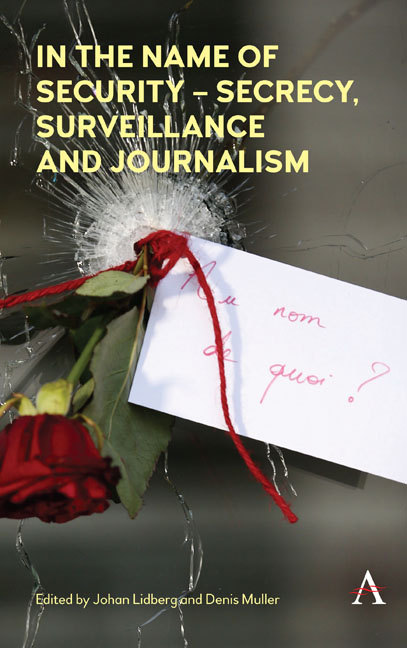Book contents
- Frontmatter
- Contents
- List of Tables
- Introduction
- Chapter 1 The Public Privacy Conundrum – Anonymity and the Law in an Era of Mass Surveillance
- Chapter 2 Undesirable Types – The Surveillance of Journalists
- Chapter 3 Surveillance and National Security ‘Hyper- Legislation’ – Calibrating Restraints on Rights with a Freedom of Expression Threshold
- Chapter 4 The Ethics of Reporting National Security Matters
- Chapter 5 When One Person's Noble Whistleblower Becomes Another's Poisonous Leaker
- Chapter 6 Who Watches the Watchmen? Access to Information, Accountability and Government Secrecy
- Chapter 7 Eyes and Ears in the Sky – Drones and Mass Surveillance
- Chapter 8 Looking over My Shoulder – Public Perceptions of Surveillance
- Chapter 9 Journalism and National Security in Three BISA Countries – Brazil, India and South Africa
- Chapter 10 Journalism and National Security in the European Union
- Chapter 11 The Security Reporter Today – Journalists and Journalism in an Age of Surveillance
- Conclusion: Journalism and the State of Exception
- Contributors
- Index
Chapter 6 - Who Watches the Watchmen? Access to Information, Accountability and Government Secrecy
Published online by Cambridge University Press: 21 June 2018
- Frontmatter
- Contents
- List of Tables
- Introduction
- Chapter 1 The Public Privacy Conundrum – Anonymity and the Law in an Era of Mass Surveillance
- Chapter 2 Undesirable Types – The Surveillance of Journalists
- Chapter 3 Surveillance and National Security ‘Hyper- Legislation’ – Calibrating Restraints on Rights with a Freedom of Expression Threshold
- Chapter 4 The Ethics of Reporting National Security Matters
- Chapter 5 When One Person's Noble Whistleblower Becomes Another's Poisonous Leaker
- Chapter 6 Who Watches the Watchmen? Access to Information, Accountability and Government Secrecy
- Chapter 7 Eyes and Ears in the Sky – Drones and Mass Surveillance
- Chapter 8 Looking over My Shoulder – Public Perceptions of Surveillance
- Chapter 9 Journalism and National Security in Three BISA Countries – Brazil, India and South Africa
- Chapter 10 Journalism and National Security in the European Union
- Chapter 11 The Security Reporter Today – Journalists and Journalism in an Age of Surveillance
- Conclusion: Journalism and the State of Exception
- Contributors
- Index
Summary
Introduction
It would be like turning off the water – it's that natural and taken for granted. I'm from the generation of journalists that were ‘born and bred’ with it [Freedom of Information]. The first job you got in a newsroom was to do the rounds at different government agencies, read their mail and archive indexes, and to learn how to interpret them. (Lidberg 2009b)
The above quote is from a news editor in a news room in Sweden describing the importance of freedom of information (FOI) to all levels of journalism in Sweden, from routine news reporting to the most advanced in- depth investigative reportage. This can be contrasted with the statement of a news editor in Australia:
I have nothing to say on the topic since we don't use FOI as a journalistic tool; besides, as far as I am concerned, FOI is dead. (Lidberg 2009a)
The quotes describe the quite extreme difference between the practical functionality of access to information regimes in mature liberal democracies. As mature democracies share the core values of freedom of expression and press freedom, which requires extensive access to information to be utilised in a meaningful way, one would assume that the access to information systems would be reasonably similar. This is not the case.
FOI is a useful point of assessment when it comes to how serious a country is regarding openness and transparency in governance, which is closely linked to the health of the democratic system. The pointy end of the openness process is of course matters of national security, intelligence and law enforcement. Releasing noncontroversial information to the public is easy; documents connected to national security is an entirely different matter.
It is important to keep in mind that no matter how advanced the visualisation tools and other software utilised in modern journalism, they can never replace the importance of independent access to raw information. The old adage holds true: poor information in, poor story out.
‘Who watches the watchmen?’ is a phrase often applied to accountability connected to journalistic practice (Leveson 2012). In this chapter, it is applied to the security and intelligence services whose primary task it is to guarantee the safety of the citizens in the countries in which they operate.
- Type
- Chapter
- Information
- In the Name of Security - Secrecy, Surveillance and Journalism , pp. 121 - 138Publisher: Anthem PressPrint publication year: 2018



